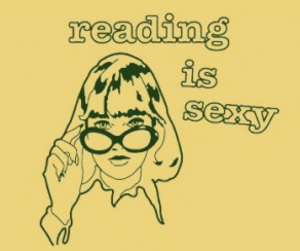Slut Lit: The Literary Feminist's Friend or Foe?
Reading is Sexy image, created by Sarah Utter
The Bed Moved, a new short story collection by Rebecca Schiff, features 23 stories with young female narrators. One of these women finds porn on her dead dad’s computer; another––a community college professor–– struggles with difficult, unmotivated students; still another wrestles with the question of whether to break up with a partner during a birthday trip to Boston. These women navigate Internet culture, memory, family, religion, culture, high school ostracization—and yes, because these narrators are humans who participate in the full range of human activities, they also navigate relationships and sex.
You know what a book like this is called?
Slut Lit.
The phrase Slut Lit first appeared on the Internet sometime in 2016, coined by book reviewers to describe works such as The Bed Moved; Mona Awad’s Thirteen Ways of Looking at a Fat Girl; Nora Zelevansky’s Will You Won’t You Want Me?; and Arlene Heyman’s Scary Old Sex. It’s apparently used to describe books by and about young women who live in their bodies, have relationships to and feelings about their physicality, and also have (sometimes sad, degrading, or just plain emotionless) sex.
But readers and reviewers are also using the term to describe Western canon novels about women who face tragic consequences after escaping bourgeois marriages. Goodreads features a Slut Lit shelf containing novels such as Madame Bovary and Anna Karenina (as well as, disturbingly, Lolita). In this incarnation, Slut Lit is used to describe books about women who break society’s molds, who might have been condemned in their time by the (male) authors who wrote about them, but who are often celebrated by modern readers.
Lest you think that Slut Lit was dreamed up by a prudish elder who wanted to shame young women for writing about their sexual experiences: the term is almost always applied affectionately, by female writers and readers who are excited both to reclaim a historically ugly word and to see women’s relationships with their own sexualities and bodies explored in literature. The authors of these books also seem all in favor of reclamation. In one story in The Bed Moved, Schiff’s narrator heartily proclaims that she only knows about two topics: parent death and sluttiness.
So is Slut Lit a powerful, wonderfully subversive new term?
Maybe. And yet. I winced when I scrolled past the phrase in my Twitter feed this week. As someone who hails from the literary world, I fear that the advent of the phrase Slut Lit will exacerbate a problem already endemic in the industry: the othering of books by women.
Here’s the thing. When a man from the literary establishment writes a book about anything—sex, relationships, ennui, elephant hunting, whatever—his book will be classified, marketed, and lauded as literature. Take Disgrace, by J.M. Coetzee, a 1999 book about a middle-aged man who embarks on several self-loathing, reputation-damaging affairs. What a universal work of literature, said the reviewers and awards committees, instead of calling it "Midlife Crisis Lit." Or, let’s look at Jeffrey Eugenides’ The Marriage Plot (2011), which tells the story of a young woman navigating sexual relationships during her messy post-college years. The book was hailed as a literary achievement; its cover features black text on white, overlaying a geometric wedding ring. But books by women about similar subject matter are often marketed with lurid green font on pink covers; they’re sold as young adult or women’s fiction, or slapped with that most derogatory of labels, Chick Lit. This term was coined ironically in the 1990s by two postmodernist female writers, but was quickly co-opted by the media to describe books about women and by women, such as Bridget Jones’ Diary.
Literature is supposed to engender compassion and empathy in its readers; it’s supposed to give us windows into worlds beyond our experience while simultaneously speaking to universal human truths. But there’s still a pervasive tendency in the literary world to code books by men or about men as universal, while books by women are exiled from the realm of “universal” and given a niche designation.
Hence my concern about Slut Lit. I know women are reclaiming their sexuality and taking control of the social narrative that has shamed them for it––and perhaps also reclaiming and controlling the tendency of the literary world to shunt their writing into a corner. But by doing so, I fear they are also handing the patriarchy the tools they need to continue labeling and diminishing these works. After all, Chick Lit started as an ironic term too.







